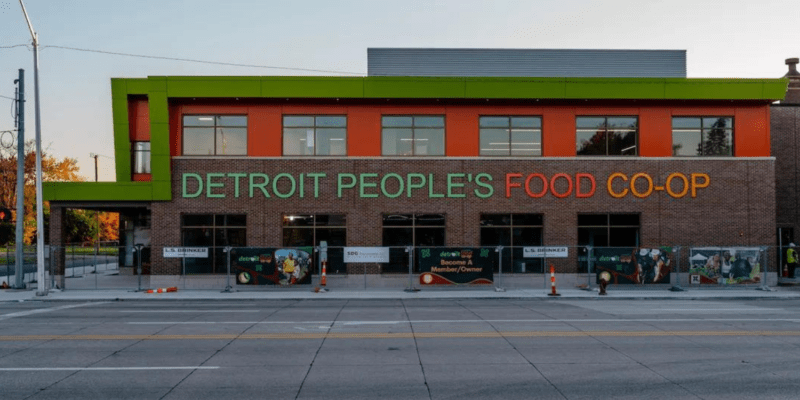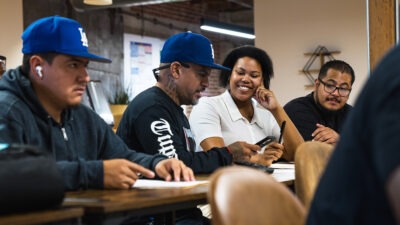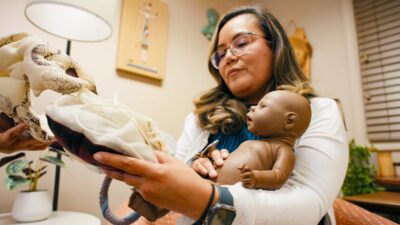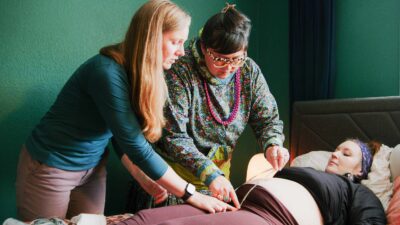This story was originally written by Darlene A. White for Outlier Media. It is the fourth in a series of nine stories funded by the W.K. Kellogg Foundation that aims to highlight stories written by emerging writers in Detroit.
The Detroit Food Commons (DFC) is set to become a transformative force in the city, offering not only access to fresh and affordable fruits and vegetables but also access to community empowerment and economic growth.
Located in Detroit’s Historic North End neighborhood at 8324 Woodward Ave., DFC is a two-story, mixed-use complex in the final stages of construction that features a full-service grocery store. Scheduled to open its doors to the public in February 2024, the building is a beacon for like-minded community members interested in the health of our residents. The project is the result of a collaborative initiative between two Detroit-based nonprofit organizations, the Detroit Black Community Food Sovereignty Network (DBCFSN) and Develop Detroit.
“DFC will bring much-needed access to fresh and nutrient-rich foods to help counter the negative effects of food insecurity, including obesity, high blood pressure, and a host of other health challenges that are negatively impacting Detroiters,” says Malik Yakini, DBCFSN co-founder and executive director, expressing the important role DFC would play in addressing the city’s most challenging health issues.
The centerpiece of the DFC project is the Detroit People’s Food Co-Op (DPFC), a community-owned and Black-led grocery store that will occupy the first floor of the building. With 2,100 member-owners, the co-op will be operated by the members of the community, which will ensure a focus on providing healthy and affordable food options. “Our goal is to provide not just groceries, but a sense of ownership and empowerment to our community,” said Chris Dilley, interim general manager of DPFC. “We are a Black-led cooperative with a strong focus on building Black food sovereignty and supporting the local Black economy.”
Interested in becoming a member? Individuals are required to make a one-time payment of $200. In exchange, they become eligible to run for a board position, participate in board elections, and share in future profits. Additionally, these members play a crucial role in electing a nine-member board of directors, comprised of volunteers responsible for overseeing the co-op’s operations and ensuring it stays aligned with its community-focused mission.
The second floor of the DFC complex will feature four commercial kitchens for emerging food entrepreneurs, a café offering healthy options, and a venue for community gatherings, discussions, film screenings and performances. “DPFC will be the only Black-led, community-owned grocery store in the Midwest, confronting extractive practices of the industry while connecting economic opportunities to local growers and farmers in the supply chain,” Yakini said.
Construction has been underway on the $21.3 million property for nearly two years. Leading the construction efforts are Russell Baltimore, assistant director of planning and design with the City of Detroit and John Abeka, design director at L.S. Brinker Company. Additionally, the Motor City Match program recently granted $100,000 to the Detroit People’s Food Co-Op, contributing to the completion of the project’s objectives and the vision of its member-owners.
“The Detroit People’s Food Co-op is going to be huge for the North End, and especially for our urban agriculture ecosystem and economy,” says Tepfirah Rushdan, City of Detroit’s director of urban agriculture. “Not only is it going to provide a convenient source of locally grown organic produce for residents, it’s also going to be a valuable retail outlet for our urban farmers. In addition to all of this, Detroiters are able to own shares in the co-op, giving them a voice in its operation.”
DPFC plans to source products from Detroit-based and Black-owned businesses while offering a wide selection of frozen foods, baked items, meats, dairy products, and health and wellness items, and a deli with a prepared foods section providing soups, sandwiches, and salads.
“This investment will also provide a platform and space to local food entrepreneurs who are interested in starting or growing their cuisine empires ultimately adding to the entrepreneurial and local food ecosystem,” said Yakini.
DPFC plans to participate in SNAP (Supplemental Nutrition Assistance Program), WIC (Women, Infants, and Children), and the Double Up Food Bucks program, and also aims to create jobs for Detroit residents, with 40 positions expected to be available by year three of operations, including department managers, assistant managers, buyers, cooks, cashiers, and stockers. “Be on the lookout for details about a hiring fair later this year as we gear up to hire in early 2024,” Dilley said. “Our goal is not only to provide affordable food but also to contribute to the economic vitality of our community.”








Comments